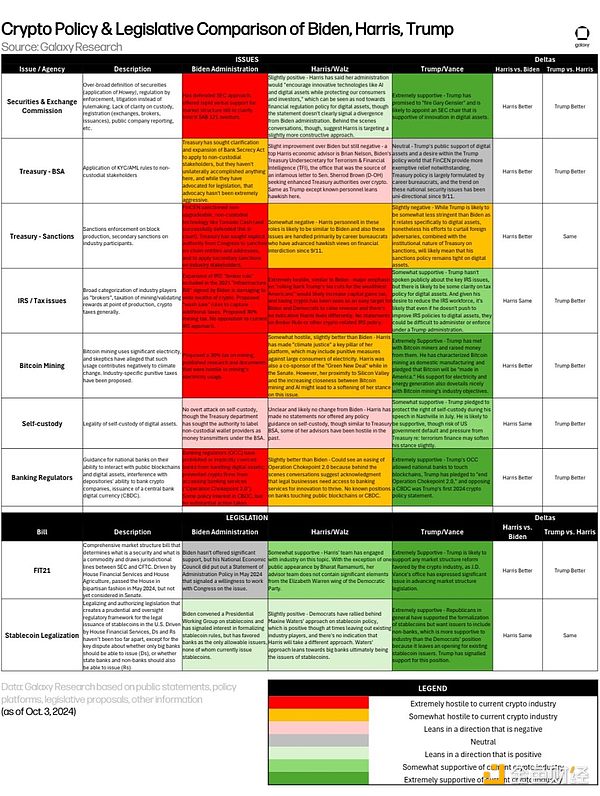
Author: Alex O'Donnell, CoinTelegraph; Compiler: Tao Zhu, Golden Finance
When former U.S. President Joe Biden left office, his cryptocurrency resume was very complicated, including tough regulatory crackdowns. , there have also been huge advances in institutional adoption.
On January 20, crypto-supporting President Donald Trump began his presidential term. While Trump has declared plans to make the United States the “cryptocurrency capital of the world,” Biden’s stance on cryptocurrencies is more ambivalent.
Under Democrat Joe Biden, U.S. financial regulators have filed dozens of lawsuits against industry companies for allegedly breaking the law. On the other hand, they have also paved the way for institutional adoption, approving many regulated crypto products and custodians.
Cryptocurrency’s four years of development have been uneven. Decentralized finance (DeFi) is effectively banned from the U.S. market, and exchanges are struggling. Meanwhile, spot crypto exchange-traded funds (ETFs), tokenized U.S. Treasuries and dollar-backed stablecoins have surged.
The showdown between Biden and Trump on encryption. Source: Galaxy Research
Regulatory crackdownIn 2021, Biden appointed Gary Gensler as chairman of the Securities and Exchange Commission, the nation’s top financial regulator. Gensler resigned as SEC chairman on January 20, the start of Trump’s presidential term.
Under Gensler’s leadership, the SEC and its sister agency, the Commodity Futures Trading Commission (CFTC), filed more than 100 legal actions against cryptocurrency companies. Targets include cryptocurrency exchange Coinbase, DeFi protocol Uniswap and infrastructure provider Consensys.
Gensler accuses the companies of failing to register as securities brokers or exchanges, claiming this "denies investors important protections, including SEC inspections, recordkeeping requirements and safeguards to prevent conflicts of interest." "
Industry executives said the agency's approach "has hindered our industry for years and limited potential technological innovation and services," Coinbase Chief Legal Officer Paul Grewal said on January 17 stated in an article above.
In 2024, about 30 cryptocurrency executives accused Biden of restricting cryptocurrency companies' access to banking services through regulators at the Federal Reserve and the Federal Deposit Insurance Corporation (FDIC).
Galaxy Research sees Trump as more supportive of Canada than Biden and Vice President Kamala Harriscryptocurrency, who is running against Trump in 2024.
Spot Bitcoin ETF assets topped $100 billion in November. Source: Eric Balchunas
Institutional AdoptionDespite Biden's tough enforcement stance, he has also presided over key developments in institutional cryptocurrency adoption and the tokenization of real-world assets (RWA).
In January and July this year, the U.S. Securities and Exchange Commission approved a dozen spot Bitcoin and Ethereum ETFs to be listed in the U.S. market.
Cryptocurrency ETFs have dominated the ETF space ever since, with net assets of the Spot Bitcoin ETF surpassing $100 billion in November. BlackRock, the world’s largest asset manager, now recommends allocating up to 2% of your portfolio to Bitcoin.
Will McGough, investment director at Prime Capital Financial, an Overland, Kansas-based investment firm, said in July: “The availability of digital assets in ETF wrappers is an absolute game-changer.” Parker's $24 billion registered investment adviser.
“The ability to access these investments through conventional investment channels may lead to broader adoption over time.”
Meanwhile, during Biden’s tenure, There has been a surge in regulated digital asset custodians in the United States, with companies including Coinbase Custody Trust, Fidelity Digital Asset Services, and Anchorage Digital Bank now authorized to custody assets for U.S. clients.
Dozens of other crypto products have also joined the fray, from options contracts on spot Bitcoin ETFs to swaps and futures pegged to meme coins like Dogecoin and Bonk.
Tokenized U.S. Treasury debt TVL has expanded during the Biden administration. Source: RWA.xyz
TokenizationProgress is not limited to traditional financial products. In 2021, asset manager Franklin Templeton launched the Franklin OnChain US Currency Fund (FOBXX), a tokenized currency fund initially launched on the Stellar network.
This is the first time the U.S. Securities and Exchange Commission has allowed investment vehicles to rely on blockchain networks’ distributed ledger technology for record-keeping.
The current total lock-in of U.S. tokenized money funds, including the BlackRock USD Institutional Digital Liquidity Fund (BUIDL), according to data services firm RWA.xyzValue (TVL) over $3.5 billion.
Meanwhile, total holdings of USDC, a U.S. dollar-backed stablecoin regulated by the U.S. Treasury Department, surged to about $45 billion during the Biden administration.
In 2024, the U.S. Treasury Department recognized that tokenization “has the potential to unlock new economic arrangements and increase efficiencies” and is currently considering tokenizing U.S. Treasury bonds.
At the same time, the CFTC began exploring the use of cryptocurrencies as trading collateral on derivatives exchanges.











